- Part of KennanX
- Podcast
Is Russia Serious About Diplomacy? With Amb. John Sullivan

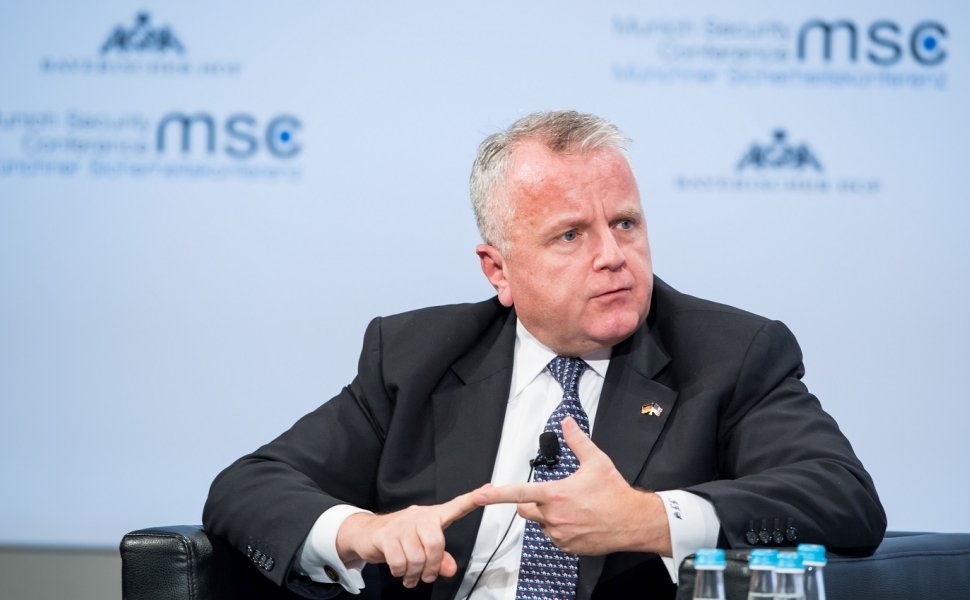
Former US Ambassador to Russia John Sullivan joins Jill Dougherty following an ambassadorship during one of the most tumultuous periods of US-Russia relations to provide his perspective on the current relationship and Russia's troubling diplomatic strategies. Their discussion also touches on the domestic impact of Russia’s invasion of Ukraine and the Kremlin's changing relationship with Evgeny Prigozhin’s Wagner Group.
Episode Transcript
-
KennanX Episode 25: Is Russia Serious About Diplomacy? With Amb. John Sullivan
This transcript has been lightly edited for clarity.
Jill Dougherty: From the Kennan Institute in Washington D.C., welcome to KennanX, a podcast on our never-ending quest to understand Russia, Ukraine and the surrounding region. I'm your host, Jill Dougherty.
***
[Audio Clip from Ambassador Lynne M. Tracy’s arrival at the Russian Foreign Ministry in Moscow]
Jill Dougherty: For anyone watching video of the new U.S. Ambassador to Russia arriving at the Foreign Ministry in Moscow at the end of January, it was painfully obvious the depths to which the U.S.-Russia relationship has sunk. In the Russian capital, where opposition protests are immediately shut down and their participants arrested, these organized protesters were allowed to get threateningly close to Ambassador Lynne Tracy as she exited her car. None of this surprises the former ambassador to Russia, John Sullivan, who left his post in September of 2022 after three challenging years in Moscow.
Ambassador Sullivan served two presidents: Donald Trump and Joe Biden. A lawyer by trade, he’s been Deputy Secretary of State, Acting Secretary of State, and has held senior positions at the departments of Justice, Defense and Commerce. He’s now back at his law firm in Washington D.C., and he’s a colleague at Georgetown University. Plus, as I learned when I interviewed him, he’s very outspoken.
***
Jill Dougherty: Ambassador John Sullivan, welcome back from Moscow and really glad you're on our podcast, KennanX. Lots of questions for you.
Amb. John Sullivan: Well, thanks Jill. It's great, great to be with you today. And happy to share what insights I can.
Jill Dougherty: Fantastic. Could we begin, and it is a little broad, but I’ll start here anyway. Relations right now… you have threats of nuclear war, obviously Russia is involved in a war in Ukraine, and relations seem to be plummeting, as if they could get any lower. So, what do you think? You've talked with Russian officials directly, what are they thinking? Where are they going with this?
Amb. John Sullivan: Well, I think they are now, particularly with the decision by the US government to send M1A1 tanks—not anytime soon, by the way—but the related decisions by our European allies, particularly Germany, to send or to authorize others to send the Leopard 2 tanks for the support of the Ukrainian Armed Forces. I mean, that has ratcheted the Russian rhetoric, at least, up a further notch if that was possible.
We've seen more references, oblique and non-oblique, to nuclear war, and by responsible Russian officials, too. Former President Medvedev, who's the deputy chair of the Security Council, his rhetoric in the last several months, or just even since the war began, it's just over the top. In describing the Ukrainian government, you know, “a pack of wild Nazi dogs,” “high on drugs,” I mean, just over-the-top rhetoric.
But more disturbing is the references to potential nuclear war, which I must say, it's been part of the Russian negotiating style—in my experience. There was, in my experience, before February 24th, 2022, the Russians would work in a reference to nuclear war, the fact that the US and Russia are the only two nuclear superpowers, in contexts where it really wasn't appropriate. And it's a negotiating technique. It's a threatening negotiating technique, but they've ratcheted the rhetoric up much more steeply, Jill, and [with] each decision by the United States, by our NATO allies to continue to arm the Ukrainians, their rhetoric gets turned up even higher. And of course, the fear is that that rhetoric will turn into something more dangerous and violent.
Jill Dougherty: Mm-hmm. And here we are, getting to the end of January—the new ambassador Lynne Tracy is in place. It's very valuable to be able to talk with you to describe things as they are and as they were in the embassy.
Amb. John Sullivan Yeah, I was actually at the State Department yesterday, for the swearing-in ceremony for one of my former colleagues, Chris Robinson, who's going to be our ambassador to Latvia. So, I was talking to people who work on the desk, the Russia desk.
So, my good friend Lynne Tracy, my successor as Ambassador, she previously served as our ambassador to Armenia. She arrived I believe Wednesday night of this week. And her first day in the embassy was yesterday, Thursday. And lo and behold, there was a, a power failure. The electricity went out across the embassy. Now I know there are power failures. There are power failures in Washington, in my home in Bethesda, around the world. But people found it curious that the power went out at the embassy the day the new US ambassador arrived, and she was scheduled to have a town hall with all of the embassy staff today, Friday. I haven't heard yet whether they got the power back on and whether that happened. It may be a coincidence. It may be an example of the host government doing all it can to distract, annoy, frustrate the new US Ambassador.
But what I, what I'd say, Jill, I'd contrast her arrival—I arrived exactly three years ago, well, a little more than three years ago in Moscow. Very different situation, different reception. Now, I got appointed by President Trump in December of 2019, and at the time, Foreign Minister Lavrov had positive, complimentary things to say about me. I remember thinking when I heard his remarks that I was grateful that he said nice things about me, but I also thought it might not stand me in good stead with others who were as suspicious of Russian intentions as I— that the Russians were praising me.
But it was an example of, and I think a real example of, their willingness to try to work with me, with the Trump administration, to try to improve US-Russia relations. We didn't succeed. There were not a lot of successes in improving US, Russia, bilateral relations. There were a lot more setbacks, far exceeded those few areas where we continued to work together. But I contrast that reception with how they've reacted to Ambassador Tracy's arrival. Very skeptical, not complimentary. Saying things like, the only matters we'll talk to the new Ambassador about are the operations of our embassy in Washington and the American Embassy here, and maybe detainees. That's it. Very frosty reception, and maybe they even turned the lights out on her when she when she arrived. I can't verify that, but it did happen.
Jill Dougherty: It could be a little welcoming sign… Well, if they don't want to talk about anything, then that gets me a little worried, because arms control is extremely important. Are they actually indicating that they don't want to talk about that either?
Amb. John Sullivan: Yeah, it's very troublesome. So, we are supposed to be having regular updates, meetings, in the format—it's called a bilateral consultative commission. It's the US-Russia mechanism to monitor and implement the New START Treaty. And it includes inspections that are authorized and required by the treaty, which by the way, was renewed by President Biden and President Putin at the beginning of February of 2021. Covid interfered with the inspections; and we suspended for a time the inspections that are required, but the Russians now have refused to reanimate those discussions and to have those inspections. And that's very troublesome. The treaty has a lifespan of only the extension: a lifespan of only five years from 2021. So, we're now in 2023. In February of 2026, this treaty lapses and it can't be extended again.
So not only are we not talking about current implementation of the New START Treaty, we are not going to the even more momentous challenge of discussing a successor to the New START Treaty. So, this is very troubling to me, and I think it all stems from the Russians’ decision after the special military operation and the West's response and the United States’ response. They're not talking to us.
Jill Dougherty: Yeah, it is very worrying. You had some very interesting insight into the very beginning, like right before the invasion in February of last year, you met with Russian officials, and I was very intrigued by the way you depicted their approach. Could you take me back to that time—the meeting that Bill Burns, CIA director, had with the head of the FSB. Just give me an idea of the flavor. What were they saying at that point? Because the United States at that point was saying, “Don't do it. We know you're, you're preparing, don't do it.”
Amb. John Sullivan: Right. So, on the one hand, to the extent that the Russians were willing to engage with us, they conveyed an image of supreme confidence, bordering on arrogance, on their ability to control what was going to happen in Ukraine. They were going to determine what was going to happen in this sovereign country, Ukraine, which Putin considers part of his imperial vision of the “triune Rus’” of Russia, Belarus, and Ukraine.
They were in a position to determine what would happen in their homeland. It was none of our business. And they were strong enough and determined enough to implement their plans. That's on the one hand. On the other hand, they would be quite perfunctory in their denials that those plans included any sort of military invasion— “of course we wouldn't do that” —but that's at a high level.
As we saw the military buildup continue, and the U.S. government and NATO and allies and partners in the OSCE engaged with Russia in late November, December, January, into February. It was a charade of diplomacy on the Russian side. The Russians were reading from scripts. They weren't engaging with us. And what I think happened: President Putin had decided that this “special military operation” was going forward. He charged the MFA, he addressed the leadership of the MFA, with Minister Lavrov, [at the] end of November 2021. And he tasked them with giving diplomacy one last chance to come up with a treaty or treaties that would provide enforceable security guarantees for Russia. And the rhetoric was a little amusing—it was variously described as bulletproof, waterproof security guarantees. He wanted ironclad security guarantees for Russia. And what, what the outcome of that was were true draft treaties, one for the United States, one for NATO with Russia, and these were styled as treaties, but they weren't serious documents. They were just bland, brief policy statements about security assurances that Russia wanted.
And then our further engagement with them, after we got these draft treaties, we got the drafts in mid-November—the Russians would read from talking points, wouldn't engage seriously in conversation, in large groups or small. It was all very scripted, and it was, I believe, an effort for the Russians, for President Putin to say, we gave diplomacy a chance—it failed. The United States, and their vassals wouldn't acknowledge our needs for security guarantees. We tried and now we're forced to invade.
Because it was a charade, I never had an opportunity to engage either one-on-one or in a larger group in a substantive conversation. It was all scripted, and that's why I've reached the conclusion, and I've said this publicly, they weren't interested in a negotiation, in a discussion. They were just going through the motions, reading from scripts to lay the groundwork for an invasion that Putin had already ordered.
Jill Dougherty: So, if you look at it right now, that immediately raises a question of any type of diplomacy to try to bring the war in Ukraine to an end. So, are they doing the same thing now? Any idea of a negotiated settlement—are they serious? They talk about it, but are they serious?
Amb. John Sullivan: Well, they talk about unconditional negotiations with Ukraine. But in fact, their conditions are that Ukraine, before the negotiations start, [has] to accept that these four new republics of the Russian Federation—this land grab by the Russians—is a fait accompli, it's no longer sovereign Ukrainian territory. And that's a non-starter for the Ukrainians. So again, it's, it's all posturing by the Russians. They are not serious about negotiating for this.
And by the way, from my perspective, having been involved in trying to negotiate with the Russians on these issues, who could trust them now? How could President Macron trust President Putin after Putin denied to his face not only that he was no intention of invading Ukraine, but he think he had no plans to do so—no plan, and Foreign Minister Lavrov said the same thing. And they said that right up until the day that the troops and tanks and the rockets crossed the border. They lied to our faces. How could anybody accept the statements that the Russians make today, given that we know, demonstrably, that they lied?
And I'm reminded of President Reagan's famous invocation of the aphorism “trust but verify.” I don't see how we get to the first part of trust. It's all about verification now. It's all about what we can see they are doing. And I just saw in the paper today, maybe it was yesterday, intelligence reporting that’s made it into the U.S. media, about the steps that the Russian military have taken to entrench themselves in Ukraine, in the Donbas, both to prepare to defend against a Ukrainian offensive and to position the Russian military to launch its own offensive. Those facts speak loudly. The rhetoric that comes out of the Kremlin or the MFA—it's just not credible.
Jill Dougherty: Yeah. And if you look at the war right now, let’s say—I mean there are all sorts of scenarios that can happen. This would indicate that this is a long slog and it will continue. But also, let's say that the war either does end or doesn't, but do you believe, as some do, that Russia wants to extend that war into other countries, threaten other parts of Europe?
Amb. John Sullivan: I guess my gut instinct is they would if they could. But, I don't know that they are planning, for example, military actions, necessarily, right now, in countries other than Ukraine. They've got their hands full in, in the Donbas right now. But here's what I'd say Jill, what they would like at a minimum, is a relationship with those other former Soviet republics, like the one they have now with Belarus. A union state with Belarus, a nation with a President, Lukashenko, who is manipulated, controlled, supported by the Kremlin. I think they would—at a minimum, that's what they want in Kyiv, in Moldova, elsewhere. If it takes Russian military action— as I say, they've got their hands full in Ukraine now. But I think that's the longer-term vision for President Putin and his and those who would follow his path, his successors, is at a minimum, the model of the relationship between Belarus and Moscow.
Jill Dougherty: Mm-hmm. And there are some experts who look at this and say, Russia also, even short of war, Russia can carry out operations that continue what you referred to as a relationship, but economic penetration, political compromise of countries in that region. Could you explain with your knowledge of Russia and the region, how does Russia carry out these operations that are short of war?
Amb. John Sullivan: Well, Jill, the example that immediately leaps to mind, that's been reported in in the press, is the mail bombs that were sent to various entities in Spain. And the suggestion being, I don't know that there's a conclusion yet by the intelligence community—that it was a nationalist group in Spain with a relationship with a notorious and sanctioned nationalist group in Russia, the Russian imperial movement or RIM, which is in turn supported, or sanctioned by the Russian Security Services by the FSB. That's of a piece with how Russia behaves in other countries.
We've got, of course, the notorious example of the attempted Skripal assassination in Salsbury that shut down a large city in England, killed an innocent UK citizen, poisoned a number of other people. There was the Tiergarten murder in Berlin of a Chechen activist—that's the really dark side of how Russia behaves in other countries.
But then there's the more aggressive economic side, whether it's in countries in Africa — in the Central African Republic, for example, where natural wealth is taken by Russians, for example, the Wagner Group in the CAR. It's a very pernicious influence, and we've seen it in the United States in election interference in 2016, ‘18 and ‘20. What I also can say from experience, having traveled extensively as deputy secretary in Eastern Europe, our friends and allies in Eastern Europe feel this most acutely. Those governments in the Baltics, in Tallinn, Riga, Vilnius and south down through into the Balkans, all feel as though they are on the front lines of this Russian hybrid warfare, which is quite pernicious.
***
Jill Dougherty: We have just a couple of minutes to talk about the Wagner group because this is really a very interesting—disturbing—but interesting phenomenon, where you have this private military contractor group owned by Mr. Prigozhin who is really directly, overtly and very publicly criticizing the regular military, the defense ministry. What do you read into that? And obviously the U.S. just termed them an international criminal organization.
Amb. John Sullivan: Right, right. No, it's been very interesting for me to see Jill, because my experience in dealing with the Russian government and trying to address the malign behavior of the Prigozhin-controlled Wagner group and many related organizations—the Internet Research Agency and so forth.
Until recently, the Russian government wouldn't acknowledge that Prigozhin and his corporate entities were engaged in any activities on behalf of the Russian government. Their response: “why are you talking to, to me about a private Russian company? We don't talk to you about Blackwater,” which is now through several corporate iterations, has had different names. But they would cite to me, “we don't talk to you about Blackwater, that's a private corporation. We don't have anything to do with Wagner.” That's all changed now. Peskov himself, Lavrov, they acknowledge that Wagner is fighting on behalf of Russia in Ukraine. Prigozhin himself is out front now in ways that he never was before. He didn't have a low profile, but he was not as blatant in his acknowledgement of what Wagner is doing in Ukraine and elsewhere.
But you hit on the key point, Jill, the relationship or the animosity that exists between Wagner and the Wagner mercenaries, and the Ministry of Defense. On the one hand, the Wagner people feel they haven't been supported by the Russian military and the Russian government, that they have been fighting President Putin's war and their accomplishments haven't been recognized. They're wounded, haven't been treated as they should be by the Russian government. They feel as though they are undervalued and making enormous sacrifices for the motherland that aren't recognized.
On the other hand, the Ministry of Defense, Colonel General Gerasimov, Minister Shoigu feel that Wagner is showboating, it’s the Russian military that's had the hard slog through this now almost year-long special military operation. And they resent the fact that [Prigozhin] is publicly criticizing senior Russian military leaders for failures in the special military operation. That does not endear Prigozhin to, to the Russian military or Ministry of Defense.
Jill Dougherty: Yeah, I know you have a busy day, but I have another area that I wanted to get into, which is, if you look at the war right now, obviously the true burden on every level is being carried by Ukraine: Ukrainians dying, the country being destroyed, many cities being destroyed.
But if you look at Russia, this war is having a very bad effect on Russia itself, with increasing domestic repression. So as a person who's looked at Russia, lived there, and you know it quite well. What would you say, at this point, Putin is trying to do domestically? And I'll give you one example, which we both know so well. He is driving out some of the most intelligent, educated people who could be very useful for the Russian economy. We saw the statistics just the other day. I think it was a hundred thousand IT people, according to the government, left last year in 2022. This is very bad for Russia. So, give me a snapshot, if you could, of what is happening to Russia itself.
Amb. John Sullivan: Well Jill, I've been in touch recently with colleagues, Russian and American, who are still in Russia, many of them in Moscow. And the effect of the war, the sanctions, the export controls, it's having a very negative effect on their lives and the economy. That's only going to increase over time. I don't know that President Putin's larger imperial ambition, the addition of these republics in Ukraine that he has claimed. I suppose there's some hope that it's very valuable land and resources that will ultimately, in the long run, contribute to the future prosperity of a larger Imperial Russian Federation.
But here's a question I asked Jill. So people were giving me, economic statistics to try to demonstrate the effect of sanctions. It hasn't been that bad. Yeah, our economy is contracted. Yeah. Inflation is, is double digit and very high. And the unemployment statistics nominally are good, but in fact there's a serious problem with underemployment in Russia. I asked a question, I said in thinking about this, and citing the effect on Russia, do you include—what I first said was—have you considered the economic effect of this special military operation on Ukraine? And I said, well, okay, that's a loaded political question. Let me ask you, if you take the Russian government at its word, if you include the four breakaway republics that are now, they claim, Russian territory, that have been for the most part, leveled. It reminds me of the old saying from, the U.S. military in Vietnam, “we had to destroy the village to save it.” Do you include those territories, if you do a calculus of Russian economic activity, do you include the destruction of those territories and what it's going to take to rebuild them in your projections of the future output of the Russian economy? And the response was a uniform, well, no, obviously we don't.
Well, if you take Putin at his word, if he succeeds, he will acquire a smoking hulk of Ukraine that he has destroyed. So, you have to add that also to the—even if you don't want to consider the legal, moral, political scandal that is the special military operation, the destruction of Ukraine. Even if you take Putin at his word that he's claiming this territory for Russia, he's destroying the village to save it. He's destroying the country to acquire it.
And the inability for some people, particularly in Russia, to imagine that Ukraine is an independent country with people who want to chart their own future. They just can't accept that. And it is, I suppose it's one way to try to adjust one's thinking and absorb the images of the brutality of what's happened with this war that's been unleashed with dead civilians, civilians who have been murdered, war crimes, et cetera. You really have to, in some ways, dehumanize the whole effort. But and it's uncomfortable when these issues are raised and Russians don't like to talk about it.
Jill Dougherty: Yeah, well, I guess we will leave it here, to be continued, because I see you on TV, I see you over at Georgetown University, and many different places, and here you are on KennanX, and I'm very grateful for that. So, I'll be very interested to see what you contribute to this discussion, because this is really a turning point, as we all know.
Amb. John Sullivan: Absolutely. This is a seminal moment in history. The start of the special military operation, and the scale that Russians have undertaken Putin's special military operation. It isn't what President Biden hinted at before the special military operation, a limited incursion in the Donbas, “little green men,” et cetera. This is full-scale, all-out war, with tens of thousands of innocent people killed. Almost 15 million refugees and internally displaced persons. All because of one government, one president's imperial ambitions.
It reminds me, on a much larger scale, of when Saddam Hussein declared that Kuwait was Iraq's 19th province, and that the Kuwaitis were behaving inappropriately and stealing Iraqi oil from a large oil field in southern Iraq. And he was just going to claim Kuwait on his own. The world back then, in 1990, the UN Security Council with, by the way, positive votes for authorization of military force by the Soviet Union and China, under the leadership of President Bush expelled Iraq from Kuwait. And as President Bush said about Saddam's invasion of Kuwait, that it will not stand, I think the world should say to the Russian government and President Putin: that his attempt to do the same to Ukraine will not stand.
Jill Dougherty: Hmm. Well, Ambassador John Sullivan. Thank you very, very much and welcome back to the United States and I am looking forward to what you will be doing in this field concerning Russia, Ukraine, former Soviet space, and making a very big contribution. Thank you very much.
Amb. John Sullivan: Well, thanks Jill. It was a pleasure to be with you again, and I look forward to our future collaboration on these important topics, including at Georgetown.
***
Jill Dougherty: A week before I talked with Ambassador Sullivan for our KennanX podcast, I conducted a long interview with him for “The Ambassadorial Series,” a project with the Middlebury Institute of International Studies, in which I interview nine former ambassadors to Russia, and the Soviet Union before it. I hope you can listen to that too. Just search for: “The Ambassadorial Series,” Middlebury.
***
KennanX is a product of the Kennan Institute at the Woodrow Wilson International Center for Scholars in Washington, D.C. It is the Wilson Center’s oldest program, founded in 1974 by George F. Kennan, American statesman, James Billington, historian and former Librarian of Congress, and historian S. Frederick Starr. Inspired by them, the Kennan Institute’s mission is to improve America’s understanding of Russia and the wider region. Thanks for listening.
Guest
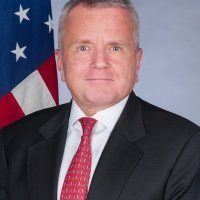
Moderator


Kennan Institute
The Kennan Institute is the premier US center for advanced research on Eurasia and the oldest and largest regional program at the Woodrow Wilson International Center for Scholars. The Kennan Institute is committed to improving American understanding of Russia, Ukraine, Central Asia, the South Caucasus, and the surrounding region through research and exchange. Read more

Related Episodes
Browse all episodes
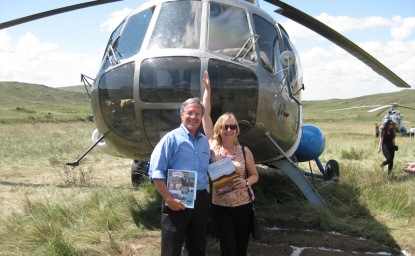
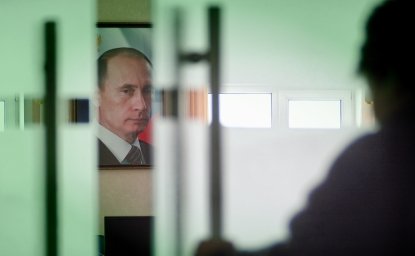
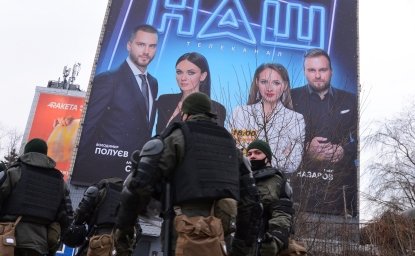
- Disinformation